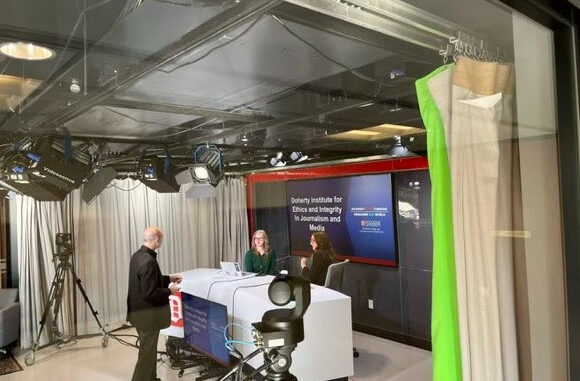
Spencer Thomas | Sports Editor
The Duquesne media department welcomed sports journalist Katie Strang to campus Nov. 2 for a series of talks and meetings with students and faculty.
Since 2017, Strang has written for The Athletic, where she specializes in investigating issues surrounding sexual abuse and gender-based violence in sports. She gained prominence for her coverage of the Larry Nassar case at Michigan State University. Prior to that, she covered the NHL for ESPN.
Strang has made a living listening to other people’s stories and telling them to an audience. Last week, she got to spend the day telling her own.
“It’s a good reminder of why I got into it,” she said of the experience. “It’s a good reminder that this is very purpose-driven work for me and most people in the industry.”
After her “amazing” dinner at Primanti’s on Wednesday, Strang began her day by doing a podcast in the new Duquesne student union TV studio. In the afternoon, Strang spoke to a pair of classes, and had lunch with the editorial staff of The Duke.
“It was a great talk,” said Ben Prantl, a student in one of the classes she spoke to. “It’s really cool that we can get these people who are working and doing good work to come and give us advice. She really knows her stuff, and that’s an impression I’d get even if she hadn’t said anything about what she’s written.”
Strang spent her talk explaining her personal relationship with the industry, which is deeply passionate and complicated. Years of being immersed in disturbing stories about abusers in sport and the structures that protect them have altered her perception of sports. She said she finds it hard to just be a fan anymore. When she sits down after work, she struggles to turn on a ballgame because she’s absorbed in the ugliest parts of life beyond the field.
That’s a far cry from the person who burst into the industry fueled by a love of sports. However, Strang said she’s perfectly comfortable with that evolution. At her core, she is a journalist, and whatever from those stories she takes, she is responsible to the truth and to making voices heard.
“You’re doing it because it feels like a calling to you. It’s something that you’re really driven to do,” she said. “That’s certainly my love affair with journalism, which certainly at times causes stress and anxiety in my life, but it also brings me a great deal of satisfaction and fulfillment and pride.”
As much as it torments her, Strang said that she doesn’t see her love for journalism ever wavering.
“It’s hard for me to ever imagine not doing some element of journalism,” she said. “In large part it doesn’t feel like work to me because I really care about the work that I’m doing, and I do find it very fulfilling.”
While visiting the Bluff, Strang mentioned how impressed she was with Duquesne’s media programs, and the people involved in them.
“Every class that I’ve been in seemed to have a such a strong foundational knowledge base and also a real earnestness to learning about the field and the industry,” she said. “I think both the passion of the students and the faculty is very evident here.”
Strang said that speaking to students, who are brimming with excitement to enter the business, she gets to see a new perspective on her own career.
“Whenever you’re feeling kind of low and depressed about journalism, one of the things that is immediately invigorating is meeting student journalists that are going to be the next generation of journalists,” she said. “That always makes me feel happy about the direction the industry is going.”
“There really was a sense of taking your work seriously,” Prantl said. “She does a lot of reporting that can wreck people’s lives if wrong, so there’s a real emphasis on getting it right and being really diligent and detail-oriented.”
Being back on a college campus also led her to reflect on her own experiences – learning about the industry, about writing and about herself. She said she is reminded of the people who helped her when she studied journalism at Michigan State and Columbia University.
“When I was a young reporter people were really kind and generous and gracious with their mentorship, their guidance and their care for me. I feel like I had a lot of really good people that were always looking out for me and trying to help me,” she said. “I’m really grateful for that, and I do want to be able to do that for others, because I know how meaningful that was for me.”

